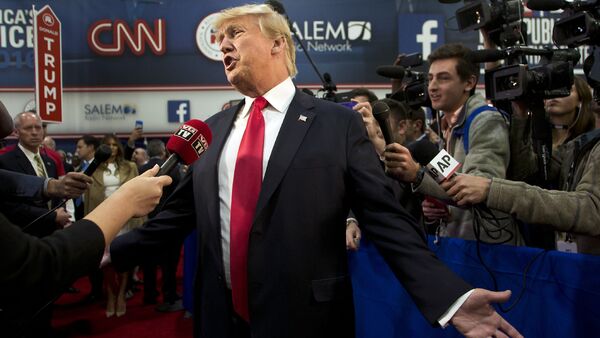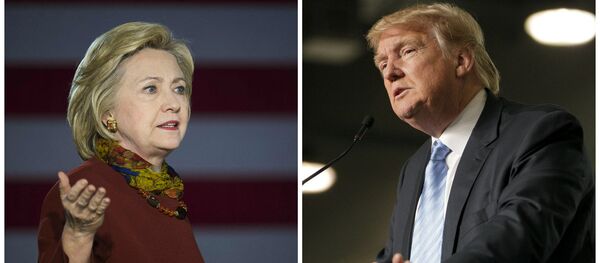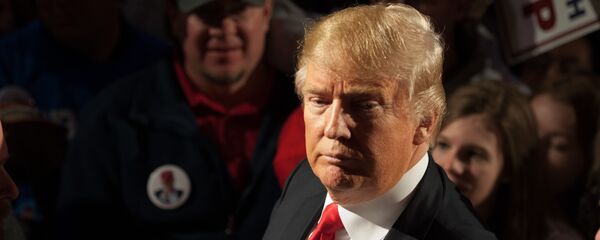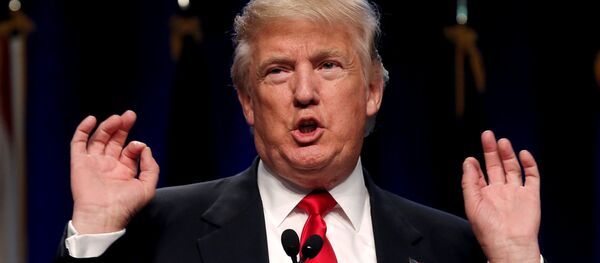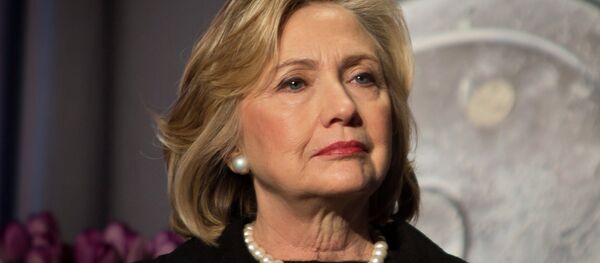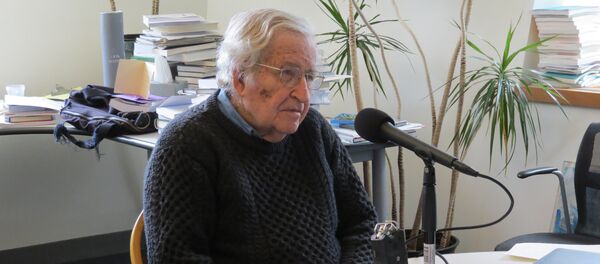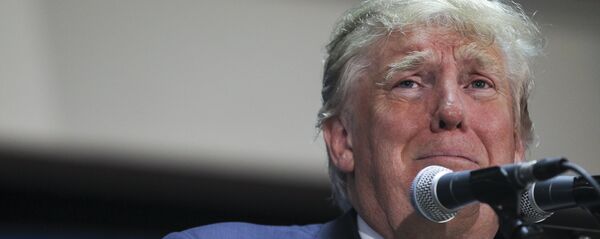For Republican candidate Donald Trump, Tuesday is setting up to be the day he hits the jackpot and clinches the nomination, argues Filimonov, the director of the Institute for Strategic Studies & Predictions at Moscow's People's Friendship University, in an article for independent Russian newspaper Svobodnaya Pressa.
"In the United States, the ideology of consumerism, the expected product of the capitalist epoch, emerged victorious a long time ago. The country's political ideology, whose basis is econo-centrism, formed a new society with its own preferences. A situation emerged in which ordinary citizens are more interested in the problems of economic growth and employment, than foreign affairs," the analyst suggests.
"In other words, before going off to the polls, the American voter takes note of the cost of gasoline he filled up on before the trip."
"He judges the effectiveness of authorities in the labor market and on inflation, despite the fact that since 1913, these parameters are shaped not by the US Treasury, as spelled out by the Constitution, but by the Federal Reserve system, whose chairman is appointed by an elite Board of Governors."
Less than 9 months from now, "on November 8, 2016, Americans will select a new president. A year ago it seemed that the United States would once again show to itself and to the rest of the world a dynastic duel between the Clintons and the Bushes, in the spirit of the XVIII century. After all, they present two aristocratic clans who, directly or indirectly, have held power in the United States for over thirty years."
"In 1981, George Bush Sr. was selected for the post of vice-president under Ronald Reagan, and in 1989 fate smiled on him to take his former boss's place. However, he did not succeed in getting reelected for a second term in 1993; many years later he would blame Fed Chairman Alan Greenspan, who refused to increase the money supply to the economy, thus luring voters to the Democratic camp."
"As a result, the American middle class picked Arkansas Governor Bill Clinton over Bush. Only in November 2000 did the Republicans get their revenge, with George W. Bush squeaking by Democrat Al Gore, Clinton's vice president."
"Now," Filimonov says, remarkably, "the balance has changed. The primary race is gaining a flavor and intrigue which is atypical for the American political system. After his defeat in the primaries in South Carolina, former Florida Governor Jeb Bush dropped out of the race. Eccentric New York billionaire construction magnate Donald Trump holds a confident lead among the Republicans, winning New Hampshire, South Carolina, and Nevada."
"The only state where Trump stumbled was Iowa, where he lost to Ted Cruz, who is currently struggling along with Marco Rubio for second place. It's possible that these names will appear on the US political Olympus as vice presidents or secretaries of state, if Trump comes to power."
"Trump," Filimonov quips, "is nothing if not eloquent, noting at his victory speech in Las Vegas that 'we weren't expected to win too much and now we're winning, winning, winning the country. And soon the country is going to start winning, winning, winning.'"
The candidate, Filimonov notes, "is not only eccentric; he's also pragmatic and perspicacious. Only this type of leader achieves success in America, where they're called 'self-made men'."
"And if Trump is a self-made man, then his most powerful opponent, Hillary Clinton, is a self-made woman. A lawyer by training, Clinton distinguished herself from childhood by her ambition. Her father, Hugh Rodham, was the owner of a small textile factory, the income from which allowed her to study in the forge of the American elite – Yale University, where she met her husband, Bill."
"In 2011," as secretary of state, "she yearned for the overthrow of Libyan leader Muammar Gaddafi. However, the war turned against her. Congress is continuing its investigation into her use of a personal email server for government business…"
"The comparison between Trump and Clinton is no coincidence," Filimonov suggests, "as the two have diametrically opposing views on Russia. The figure of President Vladimir Putin acts as a kind of beacon or compass, with evaluations of the Russian president serving to illustrate differences within the American elite. [In particular,] the Republicans see a strong Russia as a way to counter China and Europe; the Democrats need a weak Russia between China and Europe."
"It's for this reason," the analyst says, "that the billionaire real estate developer has made numerous overtures toward Moscow, criticizing his fellow Republicans," and noting that he can alone among his contenders is capable of negotiating with a leader like the Russian president.
"So what does Trump really want?" Filimonov asks. "He talks about 'taking Iraqi oil' and changing US trade policy toward China and Japan to be more in line with American interests. He launched a firestorm of criticism against Chinese President Xi Jinping, accusing him of excessive devaluation of the yuan. He has done everything he could to make a score with Beijing, something he has yet to allow himself in relation to Moscow."
"Clinton," for her part, "is working in the opposite direction, albeit carefully. 'We have to be much smarter in how we deal with Putin and how we deal with his ambitions. He's not an easy man…But I don't think there is any substitute other than constant engagement,' she has said, reasoning in the framework of deterrence, which currently looks ridiculous. 'We've got to be more united in preventing Putin from taking a more aggressive stance in Europe and the Middle East.' In other words, she's advocating an alliance between Washington and Brussels against Moscow."
"The candidates' rhetoric is something that can be discussed and analyzed for a long time, but would make little sense. After all, Americans are studying their economic statistics, and not statements on foreign policy. And the statistics are unforgiving. The Moscow Carnegie Center has calculated that under Obama, six times as many jobs were created as under Bush Jr., and corporate profits have reached new records – but at the same time, incomes have gone down, while the number of homeowners has fallen to the levels of the late 1960s."
In other words, Filimonov writes, "Trump and Clinton will have their work cut out for them in order to prevail in the struggle for voter Trust. However, the dynamic of the Trump campaign is increasingly forcing his opponents in the Republican camp to unite, gathering compromising materials, as well as negative attack ads against a strong competitor who 'plays the game with his own money', and is not dependent on the sponsors that usually fill candidates' budgets, and therefore calls the shots free from obligations to any would-be benefactors."
Ultimately, the analyst suggests, "on Super Tuesday…Trump may just win the jackpot, and then whatever remaining hopes his competitors have will become even more illusory. Among the Democratic candidates that started, two are left. Among the 17 Republicans, there are formally five, but realistically, three. According to the polls, Trump leads in 10 of 11 states on Super Tuesday. " Will he win? "Only time will tell."

